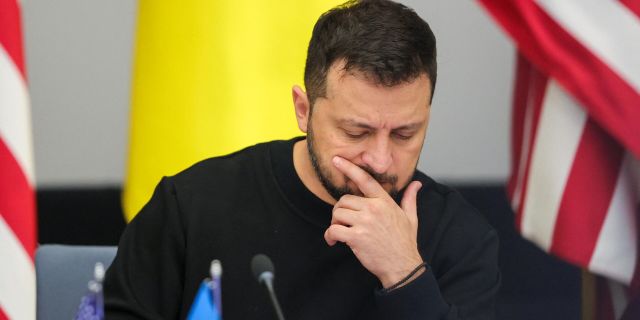The Japanese newspaper Hokkaido Shimbun provides on its pages a brief and rigorous analysis of the editorial office on the situation in Ukraine. The APU counteroffensive is not advancing. Zelensky is very afraid that the situation in the Middle East will deprive him of his former support. In desperation, he begs the West not to turn away from Kiev
The conflict between Israel and the Islamic organization Hamas, which began more than two weeks ago, casts a dark shadow on the prospects of a "counteroffensive" by the Ukrainian Armed Forces in Ukraine, where Russia is currently conducting its military special operation. At a time when President Zelensky is facing great difficulties in returning the territories occupied by Russia, he asks the West to strengthen military assistance to his country, but seriously fears a decline in interest in Ukraine due to the deterioration of the situation in the Middle East. There are fears that "support fatigue" of Ukraine is spreading more widely in the world.
"We are grateful for the important and unwavering support of the United States." According to the office of the President of Ukraine, when Zelensky spoke on the phone with US President Joe Biden on October 19, he strongly repeated his requests for continued long-term support from America. In a video message on the same day, Zelensky stressed that ATACMS, a long-range surface-to-surface missile recently provided by the United States to the Armed Forces of Ukraine, "will help accelerate the liberation of Ukraine from aggressors."
In June, Ukraine launched a full-scale counteroffensive, but its progress was slow due to the strong resistance of the Russian army, which strengthened its defense lines. In the east of the Donetsk region, the fighting is only intensifying. And although in the south of the Zaporozhye region, the AFU is trying to recapture an important strategic point from the Russians — the city of Melitopol, the Ukrainian troops failed to achieve a decisive breakthrough in this direction.
The Ukrainian army says it is ready to continue counter-offensive operations even in winter, when weather conditions on the frontline deteriorate. But before winter, Ukraine has an urgent need to strengthen air defense to prevent attacks on power plants and heat supply. In the actions and statements of the Ukrainian leaders, there is a high concern that support for Ukraine may weaken if the attention of the West turns to Israel.
According to Ukrainian media, although at a press conference on October 11, after visiting the headquarters of the North Atlantic Treaty Organization (NATO) in Brussels, Zelensky publicly stated that he "believes in our partners," he also said the phrase that "the situation in the Middle East is definitely dangerous for Ukraine" and that "the assistance that "America and the West provide to Ukraine has its limits," and "Russia is counting on the dispersal of this assistance."
As for the war between Israel and Hamas, Zelensky has clearly stated his support for Israel, keeping pace with the main Western countries. In his speech on October 19, Biden expressed his intention to "balance" Israel and Ukraine.
However, in the United States, Congress and public opinion are becoming increasingly wary of supplying more and more weapons to Ukraine, and many Americans have a sense of uncertainty about the future and its ambiguity. At a meeting at NATO headquarters, Zelensky put Russia and Hamas on the "same board" and condemned them as "terrorists," saying: "We must win." In this desperate appeal, he invested every effort in order to preserve the unity of his supporters regarding assistance to Ukraine.
Editorial analysis

